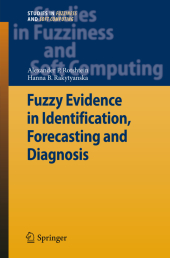 Neuerscheinungen 2014Stand: 2020-02-01 |
Schnellsuche
ISBN/Stichwort/Autor
|
Herderstraße 10
10625 Berlin
Tel.: 030 315 714 16
Fax 030 315 714 14
info@buchspektrum.de |

Hanna B. Rakytyanska, Alexander P. Rotshtein
(Beteiligte)
Fuzzy Evidence in Identification, Forecasting and Diagnosis
2012. 2014. xiv, 313 S. 235 mm
Verlag/Jahr: SPRINGER, BERLIN 2014
ISBN: 3-642-44421-0 (3642444210)
Neue ISBN: 978-3-642-44421-0 (9783642444210)
Preis und Lieferzeit: Bitte klicken
This book presents original research on fuzzy inference, describes a new model for solving inverse problems of fuzzy inference and presents applications in system control problems, sport forecasting, automobile design, system reliability analysis and more.
The purpose of this book is to present a methodology for designing and tuning fuzzy expert systems in order to identify nonlinear objects; that is, to build input-output models using expert and experimental information. The results of these identifications are used for direct and inverse fuzzy evidence in forecasting and diagnosis problem solving.
The book is organised as follows: Chapter 1 presents the basic knowledge about fuzzy sets, genetic algorithms and neural nets necessary for a clear understanding of the rest of this book. Chapter 2 analyzes direct fuzzy inference based on fuzzy if-then rules. Chapter 3 is devoted to the tuning of fuzzy rules for direct inference using genetic algorithms and neural nets. Chapter 4 presents models and algorithms for extracting fuzzy rules from experimental data. Chapter 5 describes a method for solving fuzzy logic equations necessary for the inverse fuzzy inference in diagnostic systems. Chapters 6 and 7 are devoted to inverse fuzzy inference based on fuzzy relations and fuzzy rules. Chapter 8 presents a method for extracting fuzzy relations from data. All the algorithms presented in Chapters 2-8 are validated by computer experiments and illustrated by solving medical and technical forecasting and diagnosis problems. Finally, Chapter 9 includes applications of the proposed methodology in dynamic and inventory control systems, prediction of results of football games, decision making in road accident investigations, project management and reliability analysis.
Preface.- Fundamentals of intellectual technologies.- Direct inference based on fuzzy rules.- Fuzzy rules tuning for direct inference.- Fuzzy rules extraction from experimental data.- Inverse inference based on fuzzy relational equations.- Inverse inference with fuzzy relations tuning.- Inverse inference based on fuzzy rules.- Fuzzy relations extraction from experimental data.- Applied fuzzy systems.


